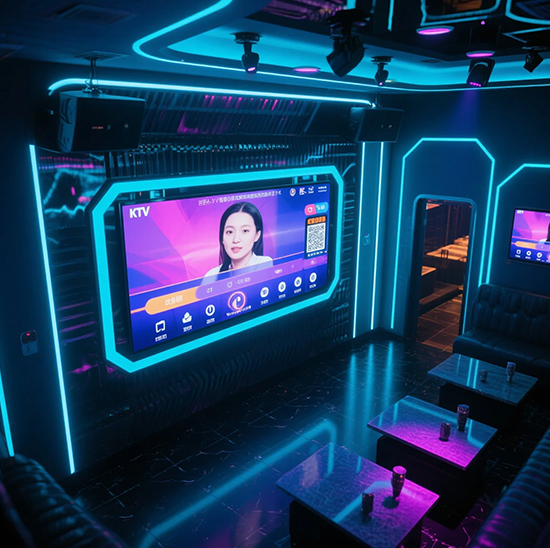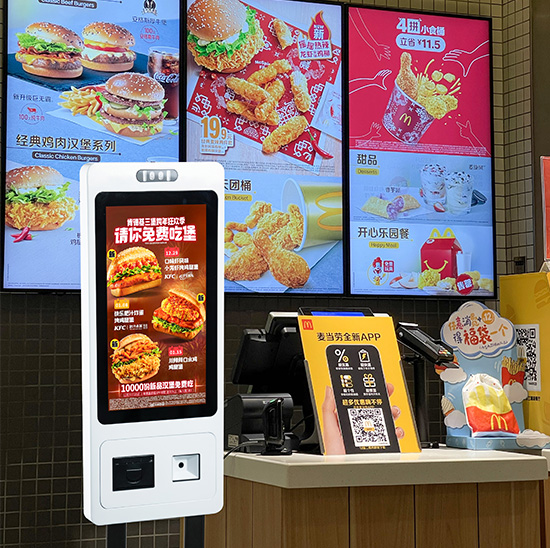Touchscreen Kiosk, as an important product of modern technology, are profoundly changing our way of life and work with their unique interactive methods and wide range of applications. This article will delve into the main characteristics of 21.5 inch Touchscreen Kiosk and their widespread applications in various fields, revealing how this technology has become a bridge connecting the digital world and the real world.

The main features of 21.5 inch Touchscreen Kiosk
Intuitive interaction
The most prominent feature of touch displays is their intuitiveness. Users only need to lightly touch the icons or text on the screen with their fingers to operate the host. This interaction method breaks free from the constraints of traditional keyboards and mice, making human-computer interaction more direct and convenient.
High sensitivity
Modern touch displays commonly use capacitive or resistive touch technology, which can quickly recognize and respond to touch actions. Whether it is single touch or multi touch, precise operations can be achieved, improving the user experience.
Good display effect
21.5 inch Touchscreen Kiosk typically use liquid crystal display technology, with bright colors and clear images, making them suitable for long-term use. In addition, some high-end touch displays also have features such as high resolution and wide viewing angle, further enhancing the display effect.
Save space
Touchscreen displays integrate display and touch functions together without the need for an external mouse or touchpad, making them ideal for desktops or mobile devices with limited space. This integrated design not only saves space, but also makes the device simpler and more aesthetically pleasing.
Diversified applications
Touch displays have a wide range of applications, from consumer electronics products such as smartphones and tablets to professional devices such as industrial control equipment and self-service terminals. This diverse application makes touch displays an indispensable part of modern technology.
Application areas of 21.5 inch Touchscreen Kiosk
Consumer Electronics
Touchscreen displays are one of the core components in smartphones and tablets. Users perform various operations by touching the screen, such as browsing web pages, watching videos, playing games, etc. The intuitiveness and convenience of touch displays greatly enhance the user experience of these devices.
Game equipment
Gaming devices also widely use 21 inch Touchscreen Kiosk. Players can control game characters by touching the screen, achieving more intuitive and precise operations. This interaction method not only enhances the fun and experience of the game, but also makes gaming devices more portable and user-friendly.
Industrial control
In the field of industrial control, touch displays play a huge role. It can make the operation interface of industrial equipment more user-friendly, achieving fast and precise operation control. At the same time, touch displays also have features such as dust and water resistance, and can operate stably in various harsh environments. This has made it widely used in industrial equipment such as CNC machine tools, ATM machines, and machine display devices.
Self service
Self service devices such as vending machines and self-service banks also widely use touch displays. Users can select products, make payments, and perform other operations by touching the screen. This self-service method not only improves service efficiency, but also reduces labor costs. Meanwhile, the intuitiveness and convenience of touch displays also enable users to perform various operations more conveniently.
Education and Training
In the field of education and training, touch displays also play an important role. It can present teaching content in a more intuitive and vivid way, enhancing students’ interest and effectiveness in learning. Meanwhile, the touch display also supports multi touch and interactive functions, allowing students to actively participate in the teaching process.
epilogue
Touchscreen displays, with their intuitive interaction, high sensitivity, good display effect, space saving, and diverse applications, are profoundly changing our way of life and work. From consumer electronics to industrial control, from self-service to education and training, touch displays are playing their role everywhere. With the continuous development of technology, touch displays will play a more important role in the future and become an indispensable part of building a smart society.



